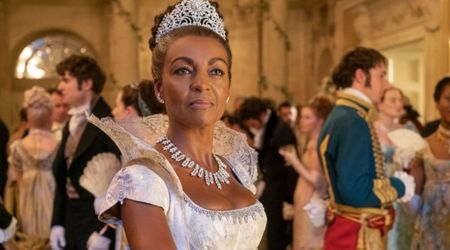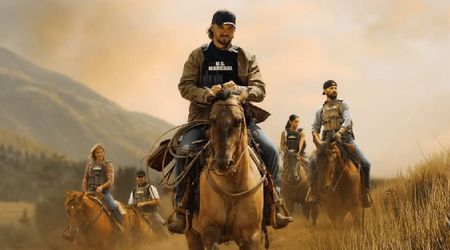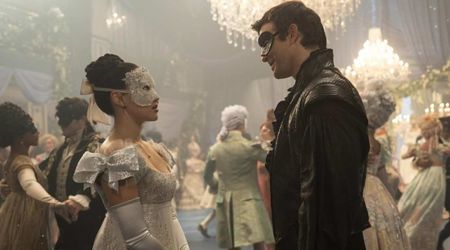'Hip Hop: The Songs That Shook America': Composing rap's history one track at a time

The showmakers of 'Hip Hop: The Songs That Shook America' have chosen six tracks spread across to make a case for their earth-shattering significance. The title is misleading, the closest a song tackled in the AMC show came to shaking America is Kendrick Lamar's "Alright". And that too by association, after it was appropriated by Black Lives Matter with its scorching verses embodying the spirit of the movement:
"When you know, we been hurt, been down before, nigga
When my pride was low, lookin' at the world like, "where do we go, nigga?"
And we hate Popo, wanna kill us dead in the street fo sho"
More than "shaking America" what "Allright" and the other five songs featured in this AMC documentary do is chart the aural, thematic and spatial trajectory of hip hop ever since it started during the riots and blackouts in New York circa late seventies. Apart from its title, the show gets the chronology of the episodes all wrong. It starts off with an hour retrospective of Kanye West via his 2004 breakout Jesus Walks, which contains elements of West's rebellion against the orthodoxy of the time - in politics as well as music.
If you are invested enough in hip hop and its history, take my advice and watch the episodes in the following chrolonology:
The Bridge (Marley Man and MC Shan, 1986 )
What better way to start a hip hop documentary than with a song that triggered that oldest of hip hop chestnut: the feud. In this case on the very origin of Hip Hop. Where did it all began? New York for sure. But where in New York?
“You love to hear the story, again and again/ Of how it all got started, way back when” declared the Juice Crew’s MC Shan at the beginning of “The Bridge."
The 1986 classic -- "designed to foster community pride" according to its synopsis on the show -- ended up igniting one of hip hop's earliest battles. This verse wasn't music to the ears of Bronx MC KKRS-One, who heard the lines as Shan claiming that hip-hop had started out in Queensbridge. KRS and his crew Boogie Down Productions responded with “South Bronx,” a detailed tour of that borough’s hip-hop history, triggering off “the Bridge Wars" and thus was born the hallowed tradition of the Art of the Diss track.
Rock Box (Run-DMC, 1984)
"Two turntables and a microphone thats' all that took to change the world," Eminem proclaimed while inducting Run DMC in the Rock n Roll Hall of fame - one of the only six hip-hop acts have been bestowed that honor. However, the series works best while mining specific musical and thematic innovations that make the songs - including Rock Box stand out rather than placing them in the grander scheme of "changing the world."
The episode has an almost a footnote of Questlove parsing the drum sounds that Run-DMC used in its 1980s heyday and how different they were from many of the music’s classic breaks. That and the use of guitars helped the band break into MTV, then just the preserve of rock bands of mainly white dudes. "It's that big rock guitar and rap combination that propelled Run DMC and Hip Hop into the mainstream," says Questlove, one of the producers along with Black Thought of the Roots, and Academy Award–winning documentarian Alex Gibney.
Needless to say, there's been no looking back since then for Hip Hop.
Here's Run-DMC rocking with Aerosmith:
Elevators (Outkast, 1996)
Southern Hip Hop has come a long way since Outkast released "Elevators" in 1996, so much so that Danny Glover's FX show 'Atlanta' is about a world that has a thriving rap scene. The situation was vastly different in the early and middle nineties when nothing mattered except beats and rhymes from the two coasts.
"Hip Hop is a territorial game," says Questlove, adding, "The South at that point was just fighting for a seat at the table. The south was very much in the shadow."
Although the show pitches "Elevator" as something that "revolutionized Southern Hip hop and music in general - everything that came after that", an argument can be made that bands like Geto Boys and UKG (both Texas rap groups) had already laid the beats for Outkast to rhyme on. But what is undeniable is that with "Elevators" and their Best New Artist win the previous year at Source Awards, Outkast made sure that Southern rap had a sizeable presence thereafter at the Hip Hop table.
And they brought oodles of charm to it, as is evident from this offering:
Jesus Walks (Kanye West, 2004)
It was reported lately that Kanye West will henceforth not be doing secular music but only gospel music. There have been quite a few examples of music stars shrugging off secular terrain for religious grounds - exhibit A being the immersion into Christianity by Bob Dylan, who in a triad of albums starting from 1979's "Slow Train a Coming" tested his fans' patience with the zeal of the converted. For pretty much all of them, it was a case of diminishing return which saw them coming back to the secular fold (Dylan with 'Infidels') or becoming obscure entities.
But West's career has been all about going against the grain, and if he wants to make this not so unexpected musical direction a success, there's no greater template than his own "Jesus Walks" from his 2004 debut 'College Dropout.' 'Jesus Walks' broke many new grounds - a gospel song with cuss words, a pop song endorsing Christianity, a rap song about Jesus the popularity of which left radio stations with no option but to play it.
"So here go my single dog radio needs this
They say you can rap about anything except for Jesus
That means guns, sex, lies, video tapes
But if I talk about God my record won't get played Huh?"
With his next album 'Jesus is King' set to be out any day now, it is yet to be seen how his musical conversion is received by his believers.
'Jesus Walks' won a grammy for Best Rap Song, and his performance at the 2005 event should have won one too.
Ladies First (Queen Latifah, 1989)
In 1989, the big hits in Hip Hop were NWA's "Straight Outta Compton", 2 Live Crew's "Me so Horny" and Tone Loc's "Wild Thing".
"It was really a toxic, masculine atmosphere, with little to no elbow room for the ladies to fit in," says Questlove.
"It is what it is. Hip Hop among with many other fields - Male dominated. you make a decision how you wanna step forward in the Belly of the Beast. Among the Lions," says Monie Love, who featured in the track now considered a feminist milestone.
Monica Lynch, president Tommy Boy Records (1985 to 2012), says the release was an eye-opener not just for the Hip Hop community but for America at large. "Ladies First" gave a very strong message to White America about black women. Black women were undervalued, underrepresented. Latifah was the first woman in Hip Hop that was political. She was an embodiment of who we were," says Me Too activist Tarana Burke.
"Queen Latifah gives women somewhat of a superhero to look upto. Someone to be like. Giving yourself permission to be big, to own the room," says MC Lyte.
"Queen Latifah, I'm so obsessed with you. Cos she knows what it takes to be a woman in a male dominated field and kick ass," says Nicki Minaj, one of the many made possible by the legacy created by Latifah.
Enough said, here's "Ladies First."
Alright (Kendrick Lamar, 2015)
Black Lives Matter activists didn't exactly have a rosy relationship with Kendrick Lamar, having taken issues with the rapper earlier over his concerns with black on black violence over police violence against black people. On the 2014 killing of 18-year-old Mike Brown by a white police officer in Ferguson, Missouri, Lamar told Billboard: "I wish somebody would look in our neighborhood knowing that it's already a situation, mentally, where it's fucked up," he said. "What happened to [Michael Brown] should've never happened. Never. But when we don't have respect for ourselves, how do we expect them to respect us? It starts from within. Don't start with just a rally, don't start from looting — it starts from within," Lamar said.
But things changed on July 26, 2015 during a Black Lives Matter conference at Cleveland State University. The activists gathered there confronted transit authority police arresting a 14-year-old for allegedly being intoxicated on a bus. After the boy was released, the attendees broke into chants of "It's gonna be alright." The moment was replicated at many BLM events and soon became the soundtrack to the movement.
"It was precisely what we needed to hear. And precisely the moment when we needed to hear it. I knew that Alright will be used to galvanize this movement as soon as I heard it. I literally say this is this generation's Fight the Power," says Burke.
"What Kendrick Lamar has done is bridge the gap between what we were doing to a new generation," says Public Enemy producer Hank Shocklee.
Documenting Hip Hop
Hip Hop as a genre will soon achieve a respectable age of around five decades, and it's about time its legacy is documented. There has been quite a few productions tackling the subjects in the last few years - from Netflix's 'Hip-Hop Evolution' to Hulu's 'Wu Tang: An American Saga'. 'Songs that Shook America' is the latest in the series and despite the occasional false notes is an admirable attempt to paint a broader picture from specific moments in Hip Hop's eventful history. If you are a fan, keep watching this space.
The series premieres on Sunday, October 13 at 12 am ET/ 9 pm PT on AMC.










